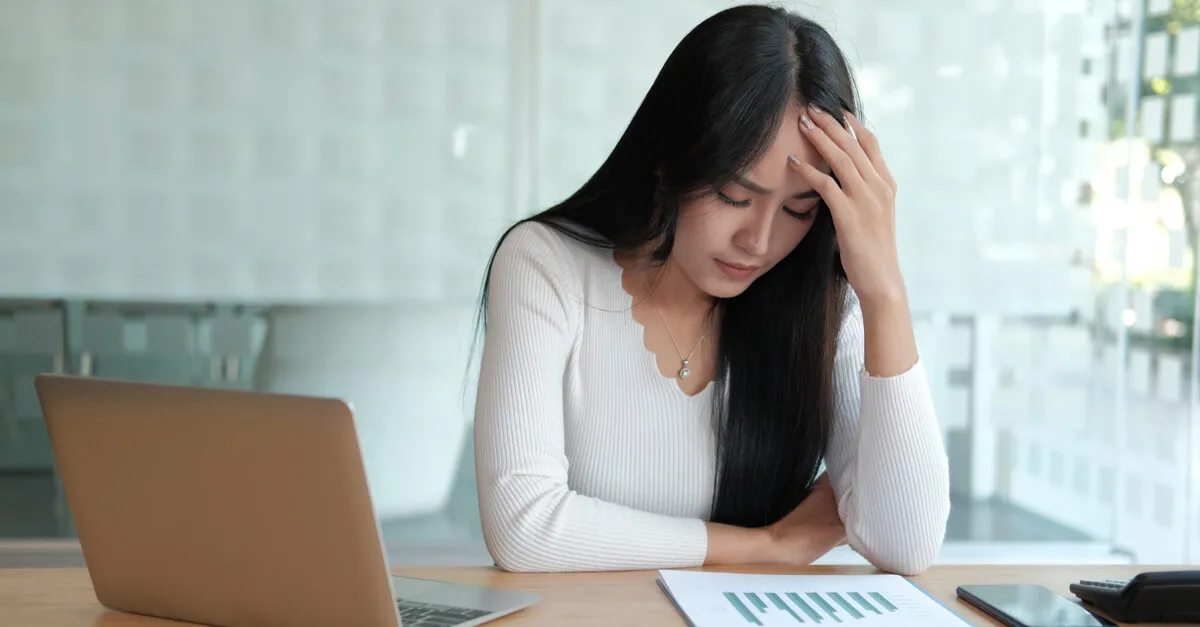
Image via Shutterstock
The current election cycle is fraught with tension and stress, which can wreak havoc on your peace of mind. Here are some steps you can take to regain your calm.
If you felt your frustration grow and your stress levels rise during the presidential debate between President Donald Trump and former Vice President Joe Biden, you may take consolation in the fact that you are not alone.
According to an article published by the American Psychological Association, the political unpredictability in our nation is causing anxiety across parties, with 62% of Republicans and 77% Democrats citing the political climate as a significant source of stress in their life.
RELATED: How to Prepare for In-Person Voting If You Have COVID-19 Anxiety
This is not a statistic to dismiss casually. As you may have heard many times, stress and anxiety can cause you to feel overwhelmed, confused, sad, or irritable. Additionally, chronic stress and anxiety can suppress the immune system, which can cause a person to get sick more often. They can also bring about tension headaches, insomnia, stomach aches, and elevated blood pressure. And let’s not forget that feeling constantly stressed, can have a negative impact in your family life and relationships.
Fortunately, here are some steps you can take to soothe those election cycle jitters.
Fact-Check Fears
“Anxiety can be magnified by irrational thoughts. For example, the thoughts that ‘something bad will happen’ might lack evidence, but still have an impact on how you feel. By examining the evidence and challenging these thoughts, you can reduce anxiety,” Miriam Rodríguez, licensed mental health counselor (LMHC) and master’s level certified addiction professional (MCAP), who practices in Miami, Florida, told The Americano.
Feelings arise without our permission. We hear something awful in the news or imagine a catastrophe befalling a loved one, and feelings of dread or even panic can overwhelm us in an instant. Remember: do not confuse feelings with facts.
It is also important to maintain perspective and avoid fatalistic views about the future. For example, remember that the country has a system of checks and balances that is slow to institute changes. “The reality is we’ve had a government that has worked for a couple hundred years,” Elaine Ducharme, Ph.D., a clinical psychologist in private practice, told Healthline.
Focus on What You Can Control
Instead of worrying incessantly about an impending disaster that may never happen, you can take a page from cognitive therapy to concentrate on the specific, productive actions that you can take. By reframing your thoughts from “It’s going to be awful” to “This is what I can do that is within my control,” you change the content of your thoughts. Then you can create a plan and focus on the steps you need to take, such as making sure you vote or even campaigning for your candidate (while accepting that the outcome is out of your control).
RELATED: ‘It’s Scary’: Six Latinas on Coping With COVID-19 Stress
Watch Your Media Diet
Although it is important to stay informed, it is equally important to be selective about your media consumption. Rely on legitimate news sources for updates, instead of the endless cycle of speculation, some of it unfounded or catastrophic, making the rounds on social media 24/7.
“Social media channels have been taken over by the elections,” says Rodríguez. “Watch enough TV to stay informed—15 to 20 minutes”.
She also believes it is important to set boundaries with the people around you.
READ MORE: Americanos Vote: All You Need to Know to Vote in the 2020 Election
“People are finding stress triggers from their own friends who have strong opinions,” says Rodríguez. For this reason, don’t solicit everyone’s opinion or engage in angry debates. “Set ground rules to keep political talk out of the dining room, social gatherings or family reunions,” she recommends. Always, agree to disagree. And if you’d rather not participate in a discussion, say that you prefer not to discuss politics.
Give Yourself a Break!
To center and calm your anxious thoughts, you need quiet time in body, mind, and spirit. Find time to “disconnect” each day and soothe your anxious mind. You may take this time to do breathing exercises, meditate, read a good book, exercise, listen to music, binge-watch a favorite TV show, write in your journal, play with your pets or even watch funny videos on YouTube. Make your “me” time a priority.
Rodríguez recommends two simple, yet powerful ways to de-stress:
“Deep Breathing is a simple technique that’s excellent for managing emotions. Not only is deep breathing effective, it’s also easy to use at any time or place.” She also recommends progressive muscle relaxation: “By tensing and relaxing the muscles throughout your body, you can achieve a powerful feeling of relaxation. Progressive muscle relaxation will help you spot anxiety by teaching you to recognize feelings of muscle tension.”
Finally, Rodríguez recommends maintaining a healthy diet, exercising, and getting enough sleep.
Know When to Seek Professional Help
Keep an eye on your eating and sleeping habits to make sure your stress levels haven’t gotten out of control. Are you able to focus on other things, get your work done, and engage in non-political activities? If any of those things are impacted, it’s probably time to take a break.
Most importantly, if election anxiety is affecting your job performance, your relationships, or your daily routine, and taking a step like limiting your interaction with news and pursuing healthy alternatives is not working, seeing a psychologist or other mental health professional may help. If you’re undergoing treatment for anxiety or OCD, the first step should be to discuss these anxieties with your therapist.

BREAKING: AG Kris Mayes sues rental corporations for conspiratorial price-fixing
It looks like, legally speaking, rent really may be “too damn high.” Arizona Attorney General Kris Mayes announced Wednesday a lawsuit against nine...

Op-ed: Trump’s journey from hosting The Apprentice to being the biggest loser
Leading up to the 2016 election, Donald Trump crafted an image of himself as a successful businessman and a winner. But in reality, Trump has a long...

Kari Lake’s plan for the US Senate: ‘The end of democracy’
The world’s most far-right political leaders flocked to National Harbor, Maryland, last week for a conservative conference where attendants idolized...

Flight attendants picket at more than 30 airports in ‘unprecedented’ show of solidarity
Hundreds of flight attendants picketed at Phoenix Sky Harbor Airport last week, calling attention to stagnant wages with low purchasing power, poor...




